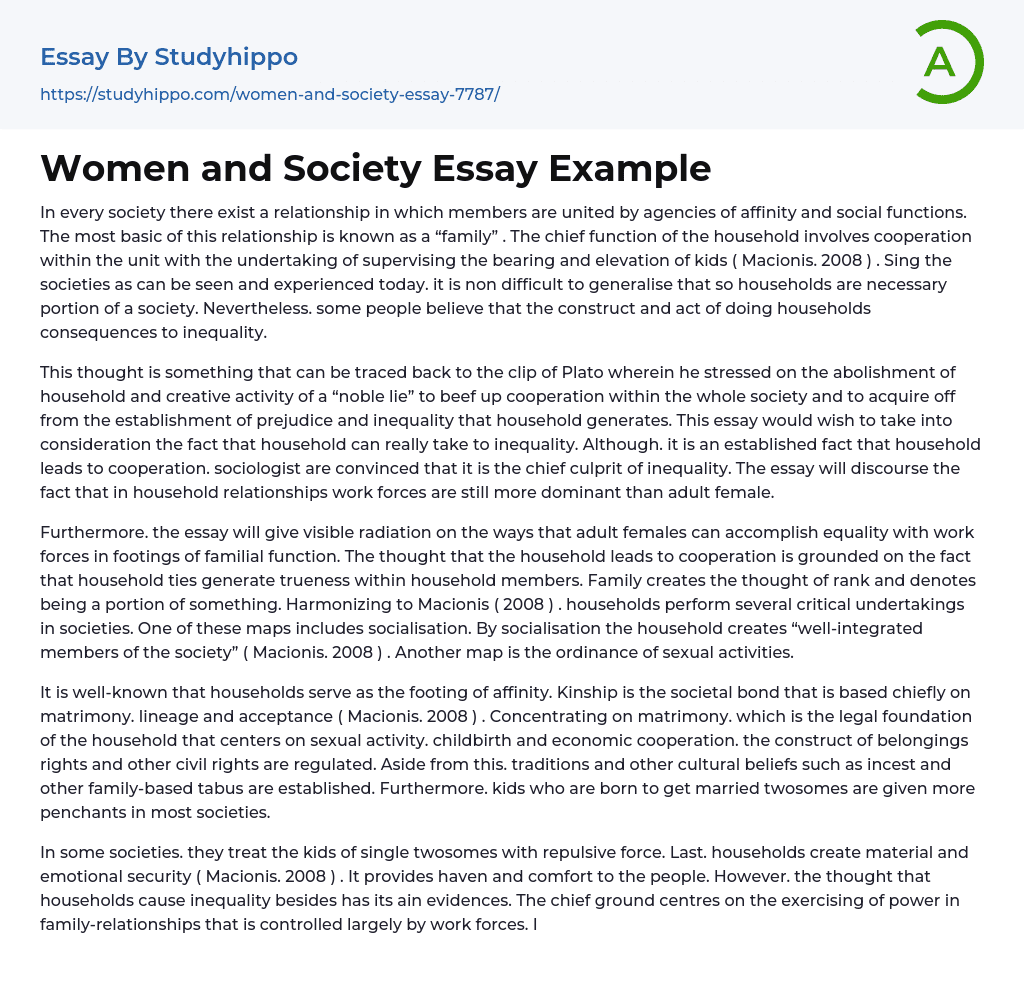The text discusses the role and functions of families in society, as well as their potential contribution to inequality. According to Macionis (2008), families are a social unit where members are united by affinity and social functions. The primary function of a family is cooperation within the unit and overseeing the raising and caring for children.
While families play an important role in society, some argue that they can also contribute to inequality. This idea traces back to Plato's suggestion of eliminating families and creating a "noble lie" to promote cooperation and eliminate biases and inequalities. This essay aims to explore how families can contribute to inequality by discussing the unequal power dynamics between men and women in family relationships.
Despite fostering cooperation, sociologists argue that families perpetuate inequality. Families create loyalty among members through household ties, establishing hierarchy and a sense of belonging
...(Macionis, 2008). Additionally, families play a crucial role in socialization, shaping individuals into well-integrated members of society.
Families also regulate sexual activities and serve as the foundation of kinship, which revolves around marriage, lineage, and adoption. Marriage encompasses various aspects such as sexual relations, childbirth, economic cooperation, property rights, and civil rights - making it the legal basis of the family structure.Families have multiple functions, including establishing traditions and cultural beliefs such as incest taboos. Additionally, in many societies, children born to married couples are favored over those born to unmarried couples. Families also provide material and emotional security by offering shelter and comfort to their members. However, it is important to recognize that families can contribute to inequality for various reasons. One significant reason is the power dynamics within family relationships, which are
often controlled by men. In today's society, women who have had multiple spouses still face negative perceptions while men with multiple spouses retain a more masculine or 'macho' image.
Moreover, despite legal protection against violence within marriages, women and children are more vulnerable to abuse than men. This unfortunate reality leads to ongoing abuse happening within their own homes. The progress and liberation of women has allowed them to work more but has resulted in neglecting children and an increase in single parenting. As women gain empowerment, their views on marriage change; however, according to sociologists like Macionis (2008), women's primary role still involves emotional care and parenting duties.
On the other hand, men are commonly seen as the breadwinners and main supporters within families.
In situations where only one parent is present, women are faced with the challenge of balancing their responsibilities in taking care of their children and supporting their family. Despite gradual changes in traditional gender roles, many families still adhere to old customs, creating a perception that men hold more power than women. Furthermore, due to the traditional caregiving role assigned to women, they often struggle to assume a more dominant position within the family structure. Although there might be instances or areas where women can gain some level of dominance, societal expectations and norms restrict its extent. Currently, adult women primarily focus on raising children and expressing affection towards them. However, advancements in reproductive technologies like in vitro fertilization have provided unconventional means for women to conceive without male involvement through methods such as sperm donation. Consequently, this allows families to exist outside of traditional marriages or legal recognition by engaging in cohabitation.
With men no longer having a role in childbearing, women have gained power and the ability to create families even without male participation. Despite the persistent influence of traditional gender roles, women are still capable of achieving positions of power. Today's societies empower women and offer greater opportunities than ever before thanks to the disregard for traditional roles leading to progress.Despite advancements in society, women still face inequality due to their ongoing responsibilities in childbirth and childrearing. The concept of family has evolved beyond being limited to a union between men and women or a legal partnership. Marriage and family now include same-sex couples and can be recognized as civil partnerships in many states and countries. However, the family remains the smallest social institution within society, even though its significance has changed. Traditional roles have shifted, allowing women to work and earn money. Yet, this shift has also resulted in a new form of inequality as women take on both breadwinning and caregiving roles simultaneously (Macionis 2008).
- Culture essays
- Social Control essays
- Citizenship essays
- Social Justice essays
- Caste System essays
- Social Responsibility essays
- Socialization essays
- Deviance essays
- Modern Society essays
- Popularity essays
- Civil Society essays
- Community essays
- Female essays
- Filipino People essays
- Igbo People essays
- Indigenous Australians essays
- Indigenous Peoples essays
- Minority Group essays
- Social Institution essays
- Men essays
- The nation essays
- Middle Class essays
- Social Norms essays
- Discourse Community essays
- Popular Culture essays
- Car Culture essays
- American Culture essays
- Mormon essays
- Indian Culture essays
- Mexican Culture essays
- Pop Culture essays
- Cultural Differences essays
- Culture Shock essays
- Different Cultures essays
- Adoption essays
- Aunt essays
- Babies essays
- Bedroom essays
- Caring essays
- Children essays
- Daughter essays
- Divorce essays
- Dog essays
- Dysfunctional Family essays
- Family Tradition essays
- Family Values essays
- Father essays
- Foster Care essays
- Friends essays
- Grandparent essays




